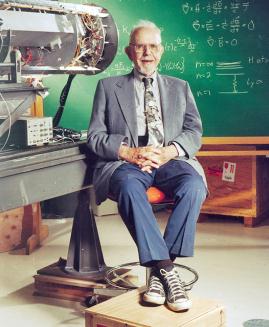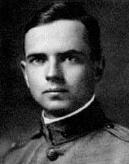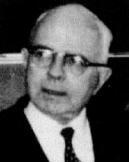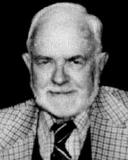Tribute to William Gould Dow on the Occasion of his 100th Birthday
The following timeline and tribute is courtesy of Environmental Research Institute of Michigan (ERIM), and originally printed in the Michigan Engineer, Winter 1996
Timeline
1895 – born in Faribault, Minnesota [Sept. 30]
1916 – BS, EE, University of Minnesota
1917 – EE degree, University of Minnesota
1919 – Lt., US Army Engineers (Nat’l Bureau of Standards and Ft. Belvoir)
1920-26 – Varied activities in industry, primarily marketing electrical equipment for Westinghouse Electric Corporation
1924 – Married Edna Lois Sontag (d. 1963)
1926 – Instructor, EE, U-M
1929 – MS, EE, U-M
1937 – Published Fundamentals of Engineering Electronics, considered the first usable textbook in electronics.
1938 – Assoc. Professor, U-M
1943-45 – Research into radar countermeasure at Radio Res. Lab, Harvard; member of Vacuum Tube Development Committee of the Nat. Adv. Res. Comm; pioneering scientific and engineering work in microwave vacuum tubes; radar countermeasures efforts of this lab helped reduce enemy radar effectiveness by close to 100%
1945 – Professor, U-M
1946 – Instrumental in the establishment of Space Physics Res. Lab; Electron Physics Lab; Plasma Engineering Lab; and with Prof. Conlon, Michigan Aeronautical Research Center (to become Willow Run Labs, and later ERIM)
1946 – Charter member of Rocket Research Panel, later the Rocket and Satellite Research Panel (monitored all US outer space research until the formation of NASA in 1958)
1947-48 – Member of the University’s Eng. Res. Council, which recognized the need for space to carry on research programs, leading to the acquisition of land in the area that now is North Campus
1950 – Obtained funding for Electronics Defense Group (later Cooley Electronics Laboratory)
1950 – [early 50s] Incorporated theory of solid-state devices into undergraduate curriculum
1950 – [mid 50s] Active in establishing Nuclear Engineering Dept and in incorporating instruction in computer engineering into the EE curriculum
1956-58 – Member of U.S. National Committee for the Int. Geophysical Year
1958 – Chairman, Dept of Electrical Engineering, U-M
1964 – Retired from teaching
1965-71 – Part-time appointment as Senior Research Geophysicist in U-M Space Physics Res. Lab.
1968 – Married Katherine (Kitty) Bird Keene
1969-70 – Three-month trip around the world, visiting foreign micro-electronics researchers and observing preparations for launch of an Italian satellite in Kenya
1972 – Co-signed (with William M. Brown and Marvin R. Holter) corporate papers establishing ERIM as an entity separate from the U-M; member of ERIM’s Board of Trustees
1980 – Honorary Doctor of Science, U. Colorado
1981 – Patented trochoidal nuclear fusion reactor (to produce electric power from nuclear fusion)
1990 – Emeritus Member of ERIM Board of Trustees
1995 – Filed application for new patent, for hydrogen generation for motive power systems
William Gould Dow

Space research pioneer Emeritus Professor William G. Dow was born in 1895 – the same year Engineering gained departmental status after 41 years as a course of study in Literature, Science, and the Arts. Dow’s contributions to the College of Engineering during his 38 years on the faculty are directly responsible for placing the University of Michigan at the forefront of engineering research. Here, Professor Dow poses next to JASPER III, the Jovian Auroral Spectograph Rocket located in the College’s Space Research Building.






Emeritus Professor William G. Dow (MSE ’29) celebrated his 100th birthday with family, former students, colleagues, and friends from around the country on September 29 and 30, 1995. The two-day William G. Dow 100-Year Birthday Celebration was hosted by the EECS Department. The event included a reception and tour of teaching and laboratory facilities of the EECS Department, a tour of Central Campus, the Michigan vs. Miami of Ohio football game, and a birthday celebration. It was a grand tribute to the engineering professor, researcher, and administrator extraordinaire.
His secrets to longevity: “Select the right grandparents, have a good family life, and don’t let the airmchair get you.”
“I climb 200 to 300 feet every day,” says Dow. “When I was 85, I lost one of the major arteries in my heart. But other arteries will do the job – if you ask them every day. They will do it. You ask them by climbing.”
Milestones in the history of technology
1895 – W.C. Roentgen discovers X-rays; Guglielmo Marconi transmits the first message from his wireless radio telegraph
1897 – Joseph Thomson discovers the electron
1900 – Air conditioning first used in textile industry; US Navy gets first submarine
1903 – [Dec 17] Orville & Wilbur Wright make first controlled sustained man-carrying airplane flight at Kitty Hawk; NC
1908 – Henry Ford designs Model T for mass production
1909 – Wright flying machine accepted for Army use
1920 – First radio broadcast, from station KDKA in East Pittsburgh, PA, set up by Westinghouse engineer Frank Conrad
WW II – Process of nuclear fission discovered in 1938; Jet aircraft demonstrated in 1939; First sustained nuclear chain reaction achieved by E. Fermie’s team at U. Chicago, 1942
Post WW II – Televisions reach the marketplace, 1945; ENIAC, first electronic digital computer, put into operation, 1946; Transistors invented, 1948
1950 – First Xerox machine made; [early 50s] Process of nuclear fusion demonstrated; research begun on development
1953 – J.D. Watson and F.J. Crick propose double helix DNA
1954 – USS Nautilus, first nuclear-powered submarine, completed
1955 – IBM ships its first business computer
1957 – First artificial satellite, Sputnik I, launched
1960 – First laser built. First communications satellite, Echo, launched
1969 – [July 20] Armstrong and Aldrin walk on the moon
mid 1970s – Internet development begins. Apple founded, 1976
1982 – Fax machines become popular when 3rd generation technology cuts transmission time to 20 seconds/page
1985 – IBM researchers in Zurich develop scanning tunneling microscope, capable of obtaining atomic resolution pictures of surfaces; British scientists report existence of a “hole” in the ozone layer over Antarctica
1990 – Global Positioning System comes into widespread usage
1995 – Physicists Eric Cornell and Carl Wieman cool rubidium atoms to 180 nanokelvin, creating a new state of matter and opening a new arena of physics
 MENU
MENU 
